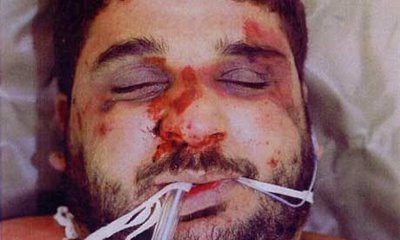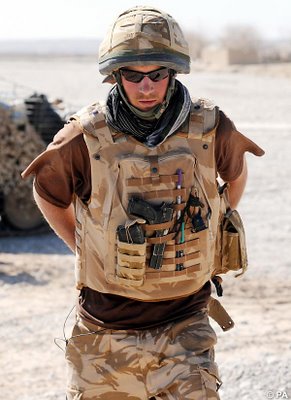Scum-watch: They've only banned page 3!
 Never let it be said that the Sun doesn't involve itself in high profile campaigns which are directed at resolving injustices that simply cannot be allowed to stand. Whether it's the right of residence for the Gurkhas, the "mothers in arms" or the right to string up paedo-pervs from the nearest lamp-post, the paper undoubtedly often provides a public service that should never be sneered at. In its latest showing of public spiritedness, it's demanding that the politically correct namby-pamby killjoys at the MoD lift the ban on page3.com.
Never let it be said that the Sun doesn't involve itself in high profile campaigns which are directed at resolving injustices that simply cannot be allowed to stand. Whether it's the right of residence for the Gurkhas, the "mothers in arms" or the right to string up paedo-pervs from the nearest lamp-post, the paper undoubtedly often provides a public service that should never be sneered at. In its latest showing of public spiritedness, it's demanding that the politically correct namby-pamby killjoys at the MoD lift the ban on page3.com.Before we get completely carried away, it's not clear whether this is a specific ban on the lovelies, whether the MoD has suddenly blocked "adult" websites from those presumably using their servers, or whether page3.com has been added to the firewalled list. The quote from the MoD in the article, that "adult content has nothing to do with our core business of defence,” suggests that it's part of a general filter. In any event, it allows the Sun to launch a frivolous campaign, just as it has whenever page3 has been "banned" by other organisations in the past.
Do the soldiers themselves really care, though? One would assume that those out in the field don't have to rely on the likes of page 3 to get their jollies; the Americans especially are notorious for the large quantity of rather harder material distributed among the ranks on DVDs. In a completely unscientific attempt to see whether it's really rankling in the ranks, I decided to check ARRSE to see if they're getting steamed up about it. As far as I can tell, there doesn't seem to be any thread whatsoever discussing the banning of the likes of gorgeous pouting Keeley from Bromley, but there is this thread, titled "So, the Sun is pro-Forces eh?", which contains these choice posts:
The Sun, is pro "The Sun" end of.
The Sun's always said it's the forces paper - but truthfully they're only onside when it suits them. As someone else said, they're only interested in selling papers.
They've run enough stories panning various parts of the forces before now, always seems to get overlooked when they say something good...
Actually the Guardian is probably more pro forces and the people who serve in them than the Sun - who as someone pointed out is pro the Sun.
Underneath every pro forces story there is usually a "do you know the individual / unit call 0800...."
So people can phone in with their stories about people and units
It dosen't take long before the papers turn on anyone look at Goody two tears ago they were trying to drive her out of the country now the Sun are claiming she's a princess and single handedly save the lives of millions of women
The Sun are c unts.
I've read many an army stich up story over the years,my own regiment included. As previous posters have stated,they play on the public sentement of the time.
Ask the scousers how well the Sun sells in Liverpool.
Which gives something of an added piquancy to this from the Sun's leader column:
Obviously they’ve never been near a war zone. Servicemen on the front line have few comforts of home — including their favourite daily newspaper.
Which seems just as likely to be the Grauniad as it does the Sun.
Labels: abuses by tabloids, bullshit, Ministry of Defence, Scum-watch, Sun-watch





